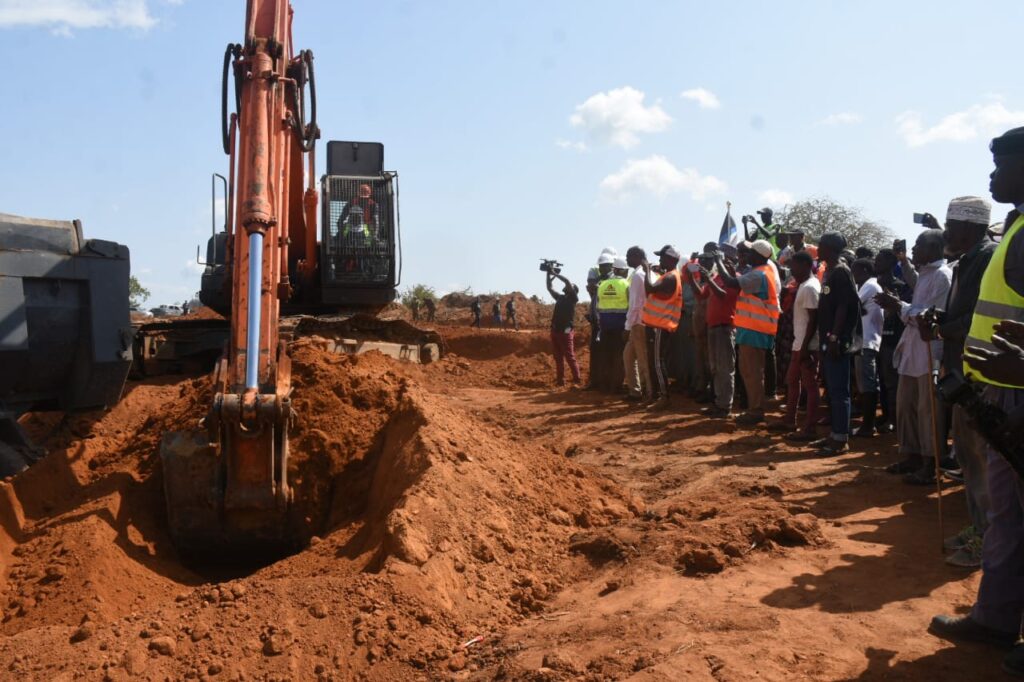By Reporter
The long thirst for water is set to be over following the launch of the sh78 million multipurpose dam at Umoja village in Lunga-Lunga sub-county, Kwale County.
The dam whose construction was launched on Thursday by Governor Fatuma Achani is expected to produce 230 million cubic meters of water to end water woes in the area.
The multipurpose dam will serve over 2000 households with clean drinking water for domestic and agricultural use from around 15 villages.
Some of the villages include Umoja A, B, C, Makamini B, Makamini Centre, Kamunyun, Mzuri B, C, Kivani, Maendeleo, Mgamani A, B and Ziwani A.
The dam’s construction is scheduled to take 10 months to complete.
Previously the locals were forced to trek for long distances of eight Kilometers in search of the commodity.
Sometimes they relied on river Umba water that comes from Tanzania and suffered stomach-related diseases because of contamination.
The water project comes as a relief since the larger part of Lunga-Lunga is a semi-arid area and locals suffer from drought and lack of rainfall during parts of the year and flooding in the rainy season.
Speaking while launching the project, Achani said her administration is committed to improving water infrastructure to end perennial water shortages, improve livelihoods and ensure food security.
“My administration is investing heavily in water infrastructure as part of the efforts to mitigate water crisis and support sustainable agricultural activities,” she said.
Achani said that the availability of clean water is critical in combating poverty and promoting development and reducing
She said that for many years, locals have wasted valuable time and energy searching for water rather than focusing on development.
The governor said the situation will now be reversed as residents will have access to clean drinking water at their doorsteps.
Achani said the multipurpose dam is projected to foster water supply and sanitation to improve general hygiene and public health.
“Water security is critical in increasing food production and mitigating health risks associated with water-borne and sanitation-related diseases,” she said.
She added that the dam project aligns with the county’s vision of becoming water-secure, with residents having easy access to clean, adequate, affordable water, sanitation, and hygiene.
Majority of the people living in rural areas in Kwale practice poor sanitation because of the limited water supply.
She said that her administration is working tirelessly to improve key economic sectors such as water, agriculture, healthcare, and education across the county.
The governor said reliable water projects are the driver of economic growth.
Achani said the dams spearhead irrigations, livestock keeping, forestry and fishery activities that will sustain the growing population of Kwale people.
She said several water projects have proved to be very significant as they transform the lives of thousands of people through agribusiness.
Achani said she is committed to constructing more dams and boreholes to enrich the Kwale food basket through agricultural activities.
She said that 17 small and medium dams have already been built, addressing water shortages in drought-prone areas of Lunga-Lunga and Kinango sub-counties.
The governor stated that the success of the water projects demonstrates the county’s progress in infrastructure development, which is aimed at improving livelihoods and living standards.
According to Achani, the county is also working on projects and programmes to improve urban and rural water supply and irrigation infrastructure to meet rising water and food demand.
The county boss said to sustain the gains in water supply there is a need for collaboration amongst members of the public and government.
She said the residents must support development projects and protect them for more long-term benefits.
A local Regina Muphela said the water project is a game changer in their lives.
She said it would help end cases of gender-based violence as long distances contributed to the sexual violation of women and girls.
Muphela said the women would also be empowered through better hygiene and development.
“Water is everything, especially for us women. We will now look good the urban ladies,” she said.
Muphela said women will now get an opportunity to engage in other women empowerment groups since water would be readily available.
Another area local Ruwa Dzuya said the water project will enable crop growth and agribusiness activities.
He said soon they will be food secure and help fight malnutrition and poverty among children and women in the region.
Dzuya said they are optimistic about securing employment opportunities through the project.


